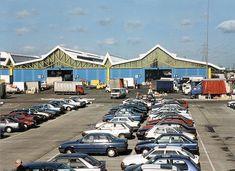



The London Markets’ Symposium, at City Hall last week, was brought to life by an impassioned presentation on behalf of all London wholesalers by Gary Marshall, chairman of Covent Garden Tenants’ Association (CGTA).
The event, backed jointly by the operators of the six main London wholesale markets - Billingsgate, Borough, New Covent Garden, New Spitalfields, Smithfield and Western International - aimed to raise the profile of wholesale and street markets in the capital, show their economic and health benefits and strengthen their connection with the independent retail and foodservice sectors.
Marshall, pictured, a wholesaler at Nine Elms for more than 25 years, who now runs Bevington Salads, learnt the trade working in the capital city’s street markets, and said markets of all kinds and sizes must support each other by reasserting their importance in London life.
“When I was growing up, street markets were the hub of local communities. Markets were where neighbours would meet and there was a sense of identity,” he said. “Today, those markets are under threat. They are seen as places just for the elderly and for ethnic communities - somewhere on the margins rather than at the heart of society.
“But new immigrants have embraced our markets, recognising their value. It is a way of buying and trading that they are familiar with, while the rest of us seem to have lost the ability to shop. Customers no longer have any connection with produce. It is the new communities who can teach us the lost skills of touching, smelling and looking for bargains, and perhaps also bring back something of the sense of community.”
He added: “Markets are not just a place for people to buy, they are also the perfect place to start in business - as I believe my own experience shows. But we are making it difficult for these small, independent traders.
“The benefits are for everyone. For the market operator, it is about income generation. For the council, it is about regenerating town centres. For the trader, it is his livelihood. For the customer, it is about range, quality, expertise, passion and price - as well as having a place where people can meet and actually talk to each other.”
Marshall said there has been a resurgence of interest in markets recently, and urged the audience to be part of a move to “take advantage of that interest now before we lose them”.
The economic downturn, he added, is bringing people back to the markets and revising their misconception that markets sell lower quality product than the supermarkets. “In fact, not only is product fresher and better than supermarkets, it is cheaper,” Marshall claimed.
Due to its location, New Covent Garden supplies 40 per cent of the fruit and veg eaten on plates out of home in London, whereas to the east and west, New Spitalfields and Western International have embraced their communities, with traders from many different ethnic backgrounds, said Marshall. “Wholesale markets are critical to the growth of London’s economy. They are at the forefront in serving the foodservice sector. The hospitality industry in London relies on the expertise of wholesale markets to source quality produce at competitive prices. And London’s economy depends on those markets and all those companies that they serve.
“All of the wholesale markets know that they need to adapt and change to survive. We have been an essential part of London’s life for centuries and intend being around for generations to come,” said Marshall.
Commenting on the relaunch of the Association of London Markets, which took place on the same day, he said markets must combine to protect each others interests. “In the past, retail trade federations protected small traders, taking on the bureaucrats and over-zealous councils. But now, most of those associations look mainly after the interests of supermarkets,” Marshall said. “I believe that the London markets, wholesale and retail, can take on this role - defending small traders, particularly street markets.”
He pointed to the latest metric martyr case, in Hackney earlier this month, as well as unfair parking restrictions, a lack of help and advice on waste control, and the congestion charge, as examples of over-regulation and bullying tactics by councils. “I recognise there has to be a level of regulation and protection of the consumer,” he said. “But what we want is a more common sense approach and recognition that markets bring more to the party than they take.
“We only have to look at what has happened in the US to see the future if we don’t support our markets and independent traders. America is a warning to us all. Whole towns and communities have been destroyed when independent traders vanished. Huge Wal-Mart’s outside the towns have ripped the hearts out of communities.
“We have to make sure that we don’t slip further down that slope, and work to keep what we have before it is too late. Convenience is great, but if it was the only option, how sad would that be?”



